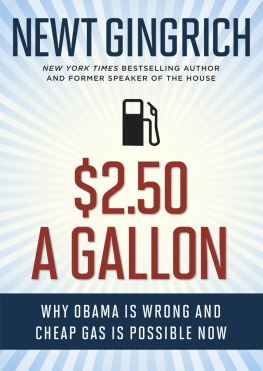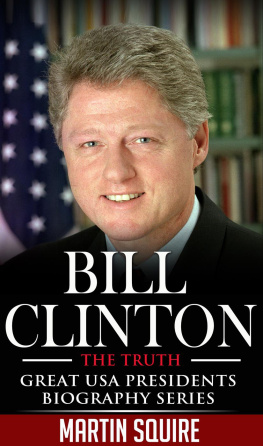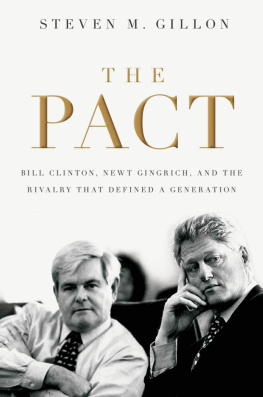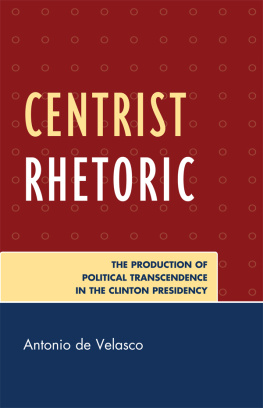Contents
F OR M OM AND D AD
A ll the momentum was with Al Gore when November 7, 2000, arrived. For much of the fall, hed lagged a few points behind, stymied by clashing public attitudes toward his boss. The economy was humming and voters were willing to credit Bill Clinton and his administration, but lingering revulsion over the presidents affair with a former White House intern left them receptive to Republican candidate George W. Bush and his promise to restore honor and dignity to the office.
Through this all, Bush had somehow managed to keep quiet a damaging secret, an old arrest for driving under the influence, back when he was thirty years old. But just days before the vote, it had all come out, reinforcing the doubts about this son of a president and his maturity. Gore closed the gap in the final polls, even grabbed the lead in one, and now as the Election Night returns rolled in, there was suspense that there hadnt been in at least a generation.
The critical call came early, or at least it seemed to. At ten minutes till eight, CBSs Dan Rather cut off the networks elder statesman, Mike Wallace, with an urgent bulletin. Mike, excuse me one second. Im so sorry to interrupt you. Mike, you know I wouldnt do this if it werent big. Florida goes for Al Gore.
The other networks followed suit, and so did the Associated Press. Floridas twenty-five electoral votes were nearly essential to each candidates path to 270a very, very, very important state, Tim Russert said on NBC. Losing it, CNNs Jeff Greenfield said, amounted to a roadblock the size of a boulder for Bush. On screen, though, the tallies continued to show Bush ahead of Gore in Florida, and votes were still being cast in the Panhandle region, part of the Central time zone. Elsewhere in the state, there were reports of long lines and delayed closings, and a flood of absentee ballots.
In Austin, the Bush team rushed network television cameras into the hotel suite where the candidate was watching returns with his family, including his father, the former president. The networks called this thing awfully early, the candidate said. But the people who are actually counting the votes are coming up with a little different perspective. And so, wereIm pretty darn upbeat about things.
Through the eight oclock hour and well past nine, Bush maintained the lead, and the networks dug in their heels. On CBS, Rather assured viewers that if we say somebodys carried the state, you can take that to the bank. But doubt began seeping into coverage. Seated next to Tom Brokaw on NBC, Russert used a pair of dry erase boards to play out Electoral College scenarios. He jotted down nine states, some of them long shots for Bush, and said the Republican would now have to carry all of them to reach 270. Suppose, Brokaw responded, that the Florida call were to be reversed. Russert promptly erased four of the states. It gets a lot easier, he said.
CNN pulled back first. Stand by, stand by, anchor Bernard Shaw interjected. CNN right now is moving our earlier declaration of Florida back to the too-close-to-call column. Twenty-five very big electoral votes, and the home state of the governors brother, Jeb Bush, are hanging in the balance. This is no longer in the victory column for Vice President Gore.
Oh waiter! Greenfield exclaimed, One order of crow!
Within a half-hour, everyone had done the same. Said Brokaw: What the networks giveth, the networks taketh away. Bush still led in the running tally, but his spread dwindled in the next hours. A recount seemed likely until, in the wee hours of November 8, the Bush advantage spiked dramatically. At 2:16 A.M. , the Fox News Channel moved to declare Bush the winner of Floridaand the presidency.
Quickly, the other networks followed. On NBC, historian Doris Kearns Goodwin was making a point about the deep divisions being revealed in the election when Brokaw jumped in.
Stop! Stop! Doris, Doris, Doris, Doris, Doris...
Uh oh! Somethings happened!
George Bush is the president-elect of the United States. He has won the state of Florida, according to our projections.
Cameras captured jubilation in Austin and dejection in Nashville, where Gore placed a concession call to Bush. On the air, there was talk of who might join the new administration and what might be next for Gore, now poised for unemployment. There was speculation about 2004. Would he run again? The First Lady, Hillary Rodham Clinton, the winner on this night of a Senate election in New York, was an obvious prospect too.
They were trying to fill time until the candidates delivered their speeches and ended this bizarrely suspenseful night. Gores motorcade arrived at the Nashville War Memorial, where his supporters were gathered. Minutes passed without him emerging. Meanwhile, the tally from Floridas secretary of state showed Bushs lead evaporating, a twist at odds with the networks own count. The waiting continued. Confusion was building. In the national popular vote, Gore was now outpacing Bush. What if more people actually voted for the losing candidate? The Constitution was clear on the supremacy of the Electoral College, but there hadnt been a split like this since 1876. How would Americans react now?
It was nearly four in the morning when Candy Crowley, stationed with the Bush campaign in Austin, came on CNNs air. Something to report to you here in this very unusual night, she said. The vice president has re-called the governor and retracted his concession, saying that Florida is too close right now.
Now all the networks were pulling back their callsagain. All right, Brokaw said, were officially saying that Florida is too close to call. So we take Florida away from George W. Bush. That means that he is short of the 270 electoral votes that he needs to win. Gore, of course, was short too. The scoreboard stood at 267 for Gore and 246 for Bush, with only Florida unresolved. Now the talk moved to a recount, and military ballots, and a report about a confusing butterfly ballot in Palm Beach County, where some Gore voters were claiming theyd mistakenly voted for Pat Buchanan, a third party candidate.
This is astonishing, Peter Jennings said on ABC.
T here would be no winner that night, or the next day, or the next week. Election Night 2000 is remembered for its wild swings of emotion and for the galling errors in exit polling and vote-counting that produced them. It became the trigger point for an even more chaotic drama, the Florida recount, which would proceed in fits and starts for the next thirty-six days until its abrupt termination by a divided Supreme Court. Only then would Bush, courtesy of an official 537-vote margin in the state, become the next president of the United States.
The 2000 election, though, was far more than the story of one pivotal state. The divisions were deep and vivid. Gore was carrying nine of the ten states north of the Mason-Dixon line, many by crushing margins, and cleaning up along the Pacific Coast, with an easy victory in California. Bush was sweeping the South, including Gores home state of Tennessee (and Bill Clintons Arkansas), and posting historic gains in traditionally Democratic Appalachia. Outside of Florida, most of the contested turf was in the Rust Belt. It all added up to the closest thing to a tie ever seen in the modern era.
These divisions were geographic, demographic, and cultural, expressed to Americans watching on television in two colors: red for the Republican states and blue for the Democratic states. The scheme was accidental. In past elections, the colors had been used interchangeably for the two parties, and it hadnt mattered at all, since there hadnt been a close race in a generation. But on this election night all of the networks had landed on the same designations, and in an instant colors that had meant nothing before came to mean everything.
Next page






